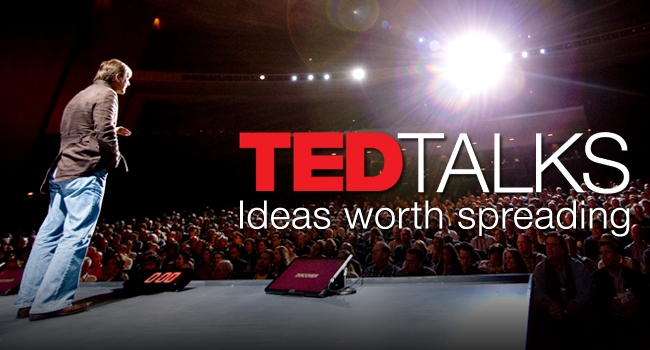by Darpan Sachdeva

In the timeless words of Oliver Wendell Holmes, Jr., it is said that.
“The human mind, once stretched by a new idea, never regains its original dimensions.”
Enter the world of TED Talks, where the intellectual boundaries of our minds are not just pushed but expansively stretched. TED conferences serve as intellectual crucibles, offering speakers to present groundbreaking ideas that resonate with innovation and leave an indelible impact. From the visionary minds of Google founders Larry Page and Sergey Brin to the inspiring tale of a resourceful Malawian teenager crafting a windmill from an old textbook in a remote village, TED Talks encapsulate the diversity and richness of human experiences.
In this curated compilation, I present to you the 13 TED Talks that transcend facets of life, each offering a profound journey into the realms of knowledge, inspiration, and transformative thinking. This post serves as a repository of intellectual gems, a reservoir of wisdom that beckons you to delve into the extraordinary narratives and transformative ideas put forth by these brilliant minds.
As you embark on this exploration, consider bookmarking this comprehensive list, a compass guiding you through the vast expanse of human thought. Take your time to peruse these talks at your own pace, savoring the wisdom that aligns with your interests, and let the dimensions of your mind stretch beyond their usual boundaries.
Medical Science
Jill Bolte Taylor’s Stroke of Insight
Dr. Jill Bolte Taylor is a Harvard-trained brain scientist who suffered a stroke in 1996, at the age of 37, in the left hemisphere of her brain. She spoke of her experience at TED and wrote a memoir about the experience titled “My Stroke of Insight: A Brain Scientist’s Personal Journey”.
Although the talk is, in part, about a brain scientist observing firsthand what it’s like to have a stroke, it goes much deeper than that. Dr. Taylor also explains her discovery that through the right hemisphere of the brain, the part of her brain that was untouched by the stroke, inner peace is just a thought away.
William Li – Can We Eat to Starve Cancer?
Angiogenesis is the process our body uses to grow new blood vessels. A typical adult has 60,000 miles worth of blood vessels. The smallest blood vessels are called capillaries–we have 19 billion of them in our bodies–, and they’re the vessels of life; however, they can also be the vessels of death. We get most of our blood vessels in the womb. Blood vessels grow in adults only under special circumstances, such as when we have an injury.
The body has the ability to regulate the amount of blood vessels that are present at any given time, through an elaborate system of checks and balances. When we need a burst of blood vessels, the body can do this by releasing stimulators. When those excess blood vessels are no longer needed, the body prunes them back.
However, sometimes there’s a defect in the system, and the body can’t prune back excess blood vessels, or it can’t grow new ones at the right place and at the right time. This causes disease; there are about 70 diseases that have an imbalance in angiogenesis as their common denominator. Cancer is one of these diseases.
Cancers start out as a small, microscopic nest of cells. This nest of cells can’t get any larger, because it doesn’t have a blood supply; so, it doesn’t have enough oxygen or nutrients to grow. Although most people have microscopic cancers in their bodies after a certain age, most will never grow to be dangerous. This is because of the body’s ability to balance angiogenesis, which prevents excess blood vessels from growing and feeding cancers.
One way to treat cancer, Li explains, is to cut off the blood supply. However, Li argues that instead of concentrating on curing cancer once it happens, we should concentrate on preventing cancer. Li goes on to say that diet accounts for 30 to 35% of environmentally caused cancers.
So, Li asked,
“What could we add to our diet that would prevent our bodies from creating the blood vessels that feed microscopic cancers?” That is, “Can we eat to starve cancer?”
The answer is, “yes”.
Here are some examples of foods which inhibit abnormal angiogenesis:
- Red grapes
- Strawberries
- Soybeans
- Green tea
- Lemons
- Apples
- Nutmeg
- Tomatoes
Li explains more about these foods, and their role in preventing cancer, in his talk.
Personal Development
Tony Robbins – Why We Do What We Do and How We Can Do It Better
Personal development author and speaker Anthony Robbins explains in his TED talk that when people fail to achieve something, the defining factor is a lack of resourcefulness. He adds that if people are resourceful enough–if they’re creative and determined enough–they’ll find a way to achieve what they’re after.
In addition, Robbins explains that our ability to be resourceful largely depends on what we choose to focus on. Every moment of your life you’re making the following three decisions:
- What am I going to focus on?
- What does it mean? (The minute you focus on something you give it meaning. And whatever meaning you give to it produces emotion.)
- What am I going to do? (Emotion then drives you toward taking action.)
Robbins then gives examples of how these three decisions shape your life. As an aside, during the talk there’s a great exchange between Robbins and Al Gore, who’s sitting in the audience.
Matthieu Ricard: Habits of Happiness
Buddhist monk Matthieu Ricard explains in his TED talk that we can train our minds in habits of happiness. He explains that often, in our quest for happiness, we look outside of ourselves. We think that if we get this or that, we’ll be happy. However, our control over the outside world is limited, temporary, and often illusory. So, if our happiness relies on something external, we’re on shaky ground.
The way to achieve happiness–which is a sense of well-being, serenity, and fulfillment–, is to look inside of ourselves, instead of looking outside. We need to realize that it’s the mind that translates what happens outside of us as either joy or suffering. Therefore, it all comes down to training the mind. Ricard adds that the best way to train the mind is through meditation.
Education
Do Schools Kill creativity? | Sir Ken Robinson
Ken Robinson argues in his TED talk that, today, creativity is as important in education as literacy. However, the way in which the educational system is set up, we’re educating children out of their creative capacity. He refers to a quote attributed to Pablo Picasso by saying that all children are born artists; the challenge is for them to remain artists as they grow up, given the way in which they’re schooled.
For example, Robinson explains that if you’re not prepared to be wrong, then you’ll never come up with anything original. Kids will risk being wrong; but by the time they grow up, most of them have lost this capacity. They’ve become frightened of being wrong. We’re running the educational system in such a way that we’re stigmatizing making mistakes.
Robinson argues that the school system creates people who live in their heads; and slightly to one side (since the subjects taught in school are mostly left-hemisphere subjects). He adds that the system is predicated on academic ability, because it was created to meet the needs of industrialism. You probably heard the following as a child:
- Don’t go into music; you won’t find a job as a musician.
- Don’t study painting; you don’t want to be a starving artist.
The consequence is that many highly talented, brilliant, creative people, think that they’re not very smart; the things that they’re good at were not valued in school. Robinson argues that we can’t afford to go on that way.
Technology
Juliana Rotich: Meet BRCK, Internet access built for Africa.
Tech communities are booming all over Africa, says Nairobi-based Juliana Rotich, co-founder of the open-source software Ushahidi. But it remains challenging to get and stay connected in a region with frequent blackouts and spotty Internet hookups. So, Rotich and friends developed BRCK, offering resilient connectivity for the developing world.
Pranav Mistry: The thrilling potential of sixth Sense technology
At TEDIndia, Pranav Mistry demos several tools that help the physical world interact with the world of data — including a deep look at his Sixth Sense device and a new, paradigm-shifting paper “laptop.” In an onstage Q&A, Mistry says he’ll open-source the software behind Sixth Sense, to open its possibilities to all.
Motivation
Simon Sinek: How great leaders inspire action
Simon Sinek presents a simple but powerful model for how leaders inspire action, starting with a golden circle and the question “Why?” His examples include Apple, Martin Luther King, and the Wright brothers — and as a counterpoint Tivo, which (until a recent court victory that tripled its stock price) appeared to be struggling.
Steve Jobs’ 2005 Stanford Commencement Address
Drawing from some of the most pivotal points in his life, Steve Jobs, chief executive officer and co-founder of Apple Computer and of Pixar Animation Studios, urged graduates to pursue their dreams and see the opportunities in life’s setbacks — including death itself — at the university’s 114th Commencement on June 12, 2005.
Elizabeth Gilbert: Success, Failure and the Drive to Keep Creating
Elizabeth Gilbert knows a thing or two about failure. Publishers rejected the former diner waitress’s memoir Eat, Pray, Love (Penguin Books, 2007) for almost six years. Once the book finally broke through, it wasn’t long before Oprah — and the rest of the world — couldn’t stop talking about it. Then it was adapted for the big screen and became a global box office hit.
Gilbert had made it big. The pressure was on for a repeat. In her TED Talk, she says it was all too much. She considered quitting while she “was behind,” but she didn’t.
“I knew that the task was that I had to find some way to gin up the inspiration to write the next book, regardless of its inevitable negative outcome,” she says.
Gilbert did write that second book and it bombed. She had failed again but didn’t throw in the towel.
She describes how she found strength in identifying with her former unpublished, struggling aspiring writer self. In facing a new challenge, she did the same thing she did when she was a failure: She got her ass back to work, as she says.
“My point is that I’m writing another one now, and I’ll write another book after that and another and another and another and many of them will fail, and some of them might succeed,” she says, “but I will always be safe from the random hurricanes of outcome as long as I never forget where I rightfully live.”
Her advice:
No matter how many times you fall down, fight the urge to stay down. Get up. Again and again, get up.
Sarah Lewis: Embrace the near win.
Hard truth: Not everything you do will be a masterpiece, especially when you’re first starting out.
In her eloquent speech, art historian and critic Sarah Lewis talks about the benefits of almost but not quite succeeding, which she calls the “near-win.” The Harvard grad and current Yale faculty member argues that our almost-failures are necessary, even crucial, steps along the way to success. Failing to reach your goal can actually sharpen your game plan and strengthen your resolve to go after it. Never give up.
“What gets us to forward thrust more is to value the near win,” Lewis says. “A near-win gets us to focus on what right now we plan to do to address that mountain in our sights.”
Philanthropy
Why giving away our wealth has been the most satisfying thing we’ve done.
In 1993, Bill and Melinda Gates took a walk on the beach and made a big decision: to give their Microsoft wealth back to society. In conversation with Chris Anderson, the couple talks about their work at the Bill & Melinda Gates Foundation, as well as their marriage, their children, their failures and the satisfaction of giving most of their money away.
Innovation
India’s Invisible Innovation
Can India become a global hub for innovation?
Nirmalya Kumar thinks it already has. He details four types of “invisible innovation” coming out of India and explains why companies that used to just outsource manufacturing jobs are starting to move top management positions overseas, too.
 Darpan Sachdeva is the CEO and Founder of Nobelthoughts.com. Driven by a profound dedication to Entrepreneurship, Self-development, and Success over an extended period, Darpan initiated his website with the aim of enlightening and motivating individuals globally who share similar aspirations. His mission is to encourage like-minded individuals to consistently pursue success, irrespective of their circumstances, perpetually moving forward, maintaining resilience, and extracting valuable lessons from every challenge.
Darpan Sachdeva is the CEO and Founder of Nobelthoughts.com. Driven by a profound dedication to Entrepreneurship, Self-development, and Success over an extended period, Darpan initiated his website with the aim of enlightening and motivating individuals globally who share similar aspirations. His mission is to encourage like-minded individuals to consistently pursue success, irrespective of their circumstances, perpetually moving forward, maintaining resilience, and extracting valuable lessons from every challenge.



I’ll right away grab your rss while i simply cannot in discovering your email subscription link or newsletter service.
Do you’ve any? Please let me understand so that I might just subscribe.
Thanks.